- Home
- Linda Byler
Becky Meets Her Match
Becky Meets Her Match Read online
The characters and events in this book are the creation of the author, and any resemblance to actual persons or events is coincidental.
BECKY MEETS HER MATCH
Copyright © 2016 by Linda Byler
All rights reserved. No part of this book may be reproduced in any manner without the express written consent of the publisher, except in the case of brief excerpts in critical reviews or articles. All inquiries should be addressed to Good Books, 307 West 36th Street, 11th Floor, New York, NY 10018.
Good Books books may be purchased in bulk at special discounts for sales promotion, corporate gifts, fund-raising, or educational purposes. Special editions can also be created to specifications. For details, contact the Special Sales Department, Good Books, 307 West 36th Street, 11th Floor, New York, NY 10018 or [email protected].
Good Books is an imprint of Skyhorse Publishing, Inc.®, a Delaware corporation.
Visit our website at www.goodbooks.com.
10 9 8 7 6 5 4 3 2 1
Library of Congress Cataloging-in-Publication Data is available on file.
ISBN: 978-1-68099-178-9
eBook ISBN: 978-1-68099-179-6
Cover design by Koechel Peterson & Associates, Inc., Minneapolis, Minnesota
Printed in the United States of America
Table of Contents
The Story
Glossary
More Books by Linda Byler
About the Author
CHAPTER 1
SHE HAD ALWAYS BEEN BIGGER, EVEN AS A BABY. She arrived on a cold November morning, round-faced and squalling, her arms already dimpled, the little rings above her feet announcing strength. She was a beautiful baby, the second daughter to be born into the Enos Esh family.
After four boys, first daughter Nancy had brought jubilation to Enos and Sadie. She had been long awaited. Then a few years later came daughter number two. Rebecca, they named her. Rebecca Lynn.
The four boys lined up by their mother’s bed in the light of the propane lamp that hissed quietly above their heads. Peering at the baby’s dimpled round face, they nodded politely, smiled shyly, then left to confer among themselves, away from the serious faces of their parents, who had hearing far above average.
“She’s fat,” said Abner.
“Red.” Junior nodded.
“Shaped like a tomato,” Aaron commented, a touch of sorrow and disappointment flavoring his words.
“One girl was plenty,” Jake said, mourning her arrival.
No one knew exactly where or how she arrived, but the boys figured the midwife’s bag was plenty big enough. The baby seemed to have come dressed in a cuddly pink blanket and sleeper.
To be born the second daughter, with four boys before her, placed Becky in the dubious position of being watched.
Monitored, supervised, observed, kept track of, and tattled on, her every misdeed recorded accurately by the queenly Nancy and her consorts, Aaron, Abner, Junior, and Jake, Becky grew into babyhood, then toddlerdom. She rolled around the kitchen on her little legs, tightly packed and sturdy like sausages.
She was cute, all right, with eyes like a trout pool, green and flecked with gold, amber, and undisturbed. Her hair was blonde with darker streaks, an unusual combination, and one no hairdresser could have imitated. Her small pug nose was like a button, her mouth wide, often stretched by her good humor. To Becky, life was funny and full of things that made her laugh, which she did often and with her whole self.
Nancy kept her in line, a mother hen who clucked and herded and denied her the freedom of making her own choices, always shored up by four pairs of disapproving eyes—Abner’s, Aaron’s, Junior’s, and Jake’s.
Becky was a whiz in school. She flew through the Spunky Arithmetic workbooks, getting 100 percent on almost every page, where she always wrote her name neatly on top—Rebecca Lynn Esh. She read the Laura Ingalls Wilder books in second grade. And she raised an eager, flapping hand for every question the teacher asked. Even then, the buttons down the back of her dress were straining to keep the fabric around her sturdy little body, the black pinafore-type apron tight beneath her arms.
Nancy, in fourth grade, thin, proper, and unimpressed, felt a blush of shame. She blinked self-consciously and lowered her head behind her spelling book. It was just that Becky was so terribly enthused, so sure of herself, and so wide. She was also short, with her too-tight dress and an appetite like a steamroller.
Becky inhaled her baggie of potato chips, trailing embarrassing crumbs that fell from her mouth when she laughed, all recess long.
And so Becky grew up under Nancy’s well meaning tutelage. She listened seriously when Nancy tried to steer her on the straight and narrow, especially when it came to her sandwiches, which were numerous, highly anticipated, and appreciated. She ate with so much gusto and gratitude as the mayonnaise oozed into white puddles on her varnished desktop. That in no way curbed her joy of food.
Food was the bliss in her lunchbox, bringing her gaiety between slices of salty ham and pleasure in the crunch of pretzels, coupled perfectly with creamy cheese chunks.
She always unwrapped a butterscotch krimpet, that Tastykake wonder, with utmost care, so as not to disturb the perfection of its rich, smooth icing. Food was a wonder, the source of endless refreshment, the axis of her world.
When Nancy was in eighth grade, the last of her school years, she was already blossoming into young womanhood, conscious of her small waist, the length of her skirt, the make of her sleeves. Sixth-grader Becky was allowed to play baseball with the upper grades that year. Nancy suffered the humiliation of her rotund sister’s noisy exuberance, her uninhibited yells when her team scored a victory, the pumping of her legs beneath too-tight skirts as she lumbered to second base. Becky’s pretty, round face was the color of a pickled red beet, her bun coming loose from its hairpins, with unattractive strubles of hair sticking out from behind her red ears.
Oh, she could hit. She could bat that softball across the fence like the boys, the eighth-grade boys. She could catch and throw like a boy, too. She was often asked to be the pitcher, drawing back her arm and letting loose a blistering throw that resulted in wails of disapproval from the opposing team.
But little by little, Nancy’s words of rebuke ate away at Becky’s abundance of faith in herself. Like waves washing over rocks every hour of the day and night, the thrust of Nancy’s words corroded her confidence, small annoyances that lodged in her mind.
First, it was the statement that no one needed, actually needed, two sandwiches in their lunchbox. Then it was a comment about the way she ran. “Don’t put your knees up so far. You put your head down and your knees up. It just looks so …”
Becky fired back, explaining why she ran as she did. But Nancy’s words stuck, sometimes retreating and hiding in the recesses of her mind, then coming out to taunt her like mocking ghosts when she lay in bed, snuggled under the fleece comforter on a cold January night.
By the time Becky reached eighth grade and Nancy had attended vocational class, graduated, turned sixteen, and begun her years of rumschpringa, most of Becky’s self-worth had become a faded memory. She lived in the shadow of her beautiful, slim, older sister, who regaled her adoring Mam with stories of her popularity, of the guys who spoke to her, of the gaggle of girls she hung out with, the dresses they bought and sewed, the shoes they discussed.
The boys, those four older brothers, were Becky’s buddies, but they were boys, living in their own rumschpringa world. Abner was already thinking of marrying a girl from New York, who was shaped like a yardstick and ate only carrots and applesauce, as far as Becky could tell.
Sometimes, Mam encouraged her to lose weight by buying cases of Diet Pepsi and low-calorie lunch meat, l
ike Oscar Mayer’s turkey breast that wasn’t smoked or salty. But you couldn’t taste much difference between it and the package it came in.
And sometimes, Becky took it upon herself to lose weight, the bottom of her Rubbermaid Lunchmate rattling loosely with one small Fuji apple, a bag of carrot sticks, and ranch dressing. On those days, all the color went out of Becky’s world, the gray mist of deprivation settled over everything, the schoolhouse and playground were places without joy.
She often reckoned that if they didn’t live on a farm and she didn’t have quite so many barn chores, her appetite would surely lessen.
If she had only an apple and carrots in her lunchbox, how was a girl expected to keep up her strength? So she sneaked cupcakes or peanut butter crackers or Oreos out of the pantry. When Mam and Nancy weren’t looking, she sat behind the henhouse and stuffed every morsel into her mouth, replenishing body and spirit.
The farm required lots of hard work, that was the thing. With her bandana stretched tightly across her forehead, over her ears, and under her bun of pinned up hair, she felt ready for anything. She felt like a biker on his Harley-Davidson, leaning back in the seat and roaring down a long Texas road.
She smiled to herself at that thought, leaned her head against a cow’s flank, and laughed outright, her spirit buoyed by a handful of molasses cookies. When she was younger, she would have told that funny thought to the boys or Nancy, but no longer. Nancy wouldn’t think it was funny, and Abner would scold her. He had become pretty close to the Bible’s description of the scribes and Pharisees since he joined the church. Aaron would make fun of her, and Junior and Jake would try not to laugh, although they often did, gasping for breath once she was out of sight.
Becky’s view of the world and its inhabitants was just plain amusing. Her brain worked differently than most people’s. How she came up with some of the things she said was far beyond what her long-suffering parents could imagine, except Dat said his brother Ike came close. So Mam always figured Becky’s humor and quick wit ran in her genes from the Esh side, but where in the world was there such an overweight young person on either side?
There wasn’t. The Eshes were all lean and rangy, hardworking muscular men and women, who ate food to keep their strength up, without any interest in cooking fancy dishes or high-calorie desserts. The women cooked meat and potatoes, dumped a bag of frozen corn or peas, perhaps lima beans, into a saucepot with salt and butter, added a dish of applesauce or brown butter noodles to the table, and that was their supper.
Neither were the Fishers overweight on Mam’s side. There were a few chunky women, after giving birth to ten or more children, but not like Becky. So Mam clucked to herself, becoming slightly more anxious as the months went by in quick succession. Surely, she’d lose weight at fifteen, after she finished vocational class. She would.
Becky breezed through vocational class, keeping her diary where she enumerated her farm chores and detailed her education for becoming an Amish housewife. She graduated, framed the certificate, and hung it on her bedroom wall, but she never lost a pound. Her continued interest in all things edible was a source of irritation to her older sister and a secret concern of Mam’s, although they both did a commendable job of hiding this.
Sometimes, when Becky slurped rapid spoonfuls of Cinnamon Life, her favorite cereal, Nancy would clear her throat and make some snide remark, which seemed not to penetrate her sister’s consciousness at all. But Becky was wondering how Nancy could presume to know how hungry she was. After all, Nancy didn’t help with the milking. She had a job. A job that started with a capital J, as if that was a title. It was an important thing, Nancy’s job. It supplied Mam with her week’s supply of grocery money, or money for the greenhouse or Walmart or Target or the fabric store, whatever.
Nancy made a lot of money, but she was only allowed to keep one-fourth of it. The rest was supposedly Mam’s. This made no sense to Becky, since most of that money went right back to Nancy. Mam spent it on quilts and hope chest stuff and Tupperware and Princess House things for Nancy, who wasn’t even dating. “Not that she didn’t have the opportunity,” Mam would always add. Well, she should be dating, Becky thought, with all that Tupperware melting in the attic.
And they sewed. They sewed endlessly. Blue dresses and green dresses and red and purple and pink. Every event needed a new dress. Becky sat on the recliner with a bag of Starburst Jellybeans and listened to the steady humming of the sewing machine. She wondered when her turn would come. Likely Mam wouldn’t sew for her, as big as she was.
When Becky’s sixteenth birthday loomed a few months away, she was still short and as round as a barrel. She weighed herself in secret, but told no one, not even her closest friend, that she weighed only a sliver away from two hundred pounds.
She didn’t feel that big. She never had and never would. Inside, she felt just like the thin girls. In her own eyes, she looked like them. Only the scales revealed her sincere love of food.
When Mam approached her about starting to sew dresses for her sixteenth birthday, Becky shrugged, said something that showed she didn’t care at all, not one smidgen, and went right on polishing off a bag of Uncle Henry’s hard pretzels, her favorite.
Then there was the question of someone hiring Becky. She needed a job. Having been content to help on the farm, doing the morning and evening milking with her father, feeding calves and the Rhode Island Reds in the henhouse, driving a team of brown mules hitched to the harrow or the baler, helping her mother in the garden, then canning, preserving, and freezing the large amounts of vegetables they put up every year, Becky never imagined having an actual job. But it became a real requirement now.
With her sixteenth birthday just over the horizon, an unknown and very scary event she could not avoid, she figured she may as well face this thing head on and get a job since Mam kept hinting around.
There was the local Amish bulk-food store, the greenhouse in Waverly, the households in town who were always looking for cleaning help. There were the two dry-goods stores and a few nearby restaurants. She could babysit other people’s children, but the pay was low, the children weren’t always obedient, and the mothers could be very picky. She was ready to cross that possibility off the list.
She mulled over her predicament as she peeled potatoes one evening in September. The sky was streaked with red and purple, turning the brown grasses that looked old and worn out into a beautiful sea of deep indigo, the leaves on the trees a richer shade of green.
Nancy came to stand beside her, with that sniff which meant she was about to make an important announcement. Becky kept on peeling potatoes stiffly.
“So little sister,” Nancy drawled, the condescension oozing from her words like cornstarch pudding in a Boston cream pie.
Becky chose to direct her utmost attention to peeling the potatoes.
“So,” Nancy began again, drawing a deep breath. “So, you’ll be with the youth before you know it, Becky, which means you’ll need new dresses. That’s exciting for you, right?”
“I guess so.”
“Well, I don’t want to hurt your feelings in any way, but I told Mam I would try and talk to you. You see, Becky, it would be much easier to make your dresses and buy shoes if you lost weight. I thought maybe you’d be willing to go on this Weight Watchers program. I have all the books you’ll need. You don’t count calories; you just go by a points system.”
Becky threw the last cut potato into the pot of cold water, set the kettle on the gas range, and flipped the burner knob. She turned to look squarely at her sister, keeping her face without expression, as bland and flat as a vanilla cookie.
“I mean, you know Becky, don’t be hurt by what I’m saying.”
Becky lifted her shoulders and let them fall. “I’m not.”
“Good. All I’m saying is it’s just too bad you aren’t a bit, uh, thinner. You’re so pretty and have a nice personality, and you could easily have a boyfriend if you weren’t …”
“So fat,”
Becky finished.
“That’s not a nice way to say it. I don’t mean it like that.”
“It’s okay, Nancy. Really.”
“So you’ll try?”
Becky scraped the potato peelings into the garbage and nodded, promising her sister that, yes, she’d look at the Weight Watchers plan.
Later, she caught Nancy and her mother casting quick, nervous glances toward her as they held a whispered conversation in the kitchen.
Becky showered, brushed her teeth, and went to bed early. The evening was chilly, and she was tired from a day of driving the hay wagon, picking up the last of the fourth cutting of alfalfa. The bales had been wet and cold and heavy.
She turned up the battery lamp by her bed, grabbed her book, and tried to read, but the words blurred across the page as if they were swimming. She put the book down, swiped fiercely at her eyes, and switched off her lamp. She lay flat, crossed her hands across her soft, round stomach, and thought very seriously about her life so far, what she expected in the future, and what was most important.
So would the whole world change because she reached her sixteenth year? No, it would not. She would still be Becky Esh. Short and round, and yes, fat. Would that be so awful? Would her friends desert her and God dislike her for being fat? No.
So who would judge her? Only people like Nancy and Mam, who were ashamed of her. Well, let them be ashamed. That would be just fine.
No one was going to make her feel small or take away her confidence. She would not let them.
Becky had no intention of even looking at that stupid weight-loss literature. If Nancy thought for one minute that she was going to weigh tiny portions of food on a scale, or check how many points were in a whoopie pie or a banana, well, she could think again.
I am just me, no more, no less. I was born to love food, and if I am a larger size than some girls, who cares? I am me. Rebecca Lynn Esh. I have the whole future ahead of me, and I will not cringe and be ashamed of who I am. If people don’t like me, well, that’s just tough.

 A Second Chance
A Second Chance Lizzie's Carefree Years
Lizzie's Carefree Years The More the Merrier
The More the Merrier Love in Unlikely Places
Love in Unlikely Places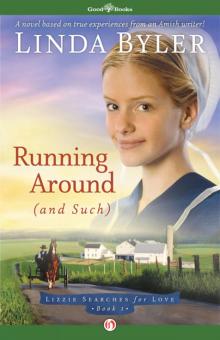 Running Around (and Such)
Running Around (and Such) Wild Horses
Wild Horses Lizzie Searches for Love Trilogy
Lizzie Searches for Love Trilogy Lizzie and Emma
Lizzie and Emma Little Amish Matchmaker
Little Amish Matchmaker The Witnesses
The Witnesses The Healing
The Healing Home Is Where the Heart Is
Home Is Where the Heart Is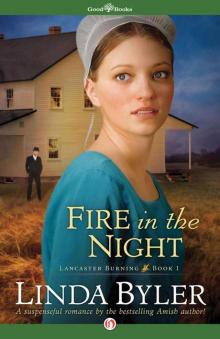 Fire in the Night
Fire in the Night When Strawberries Bloom
When Strawberries Bloom Little Amish Lizzie
Little Amish Lizzie Which Way Home?
Which Way Home? The Homestead
The Homestead Sadie’s Montana Trilogy
Sadie’s Montana Trilogy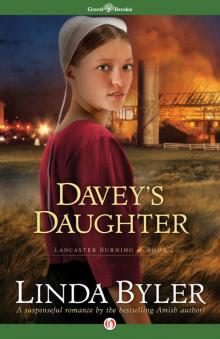 Davey's Daughter
Davey's Daughter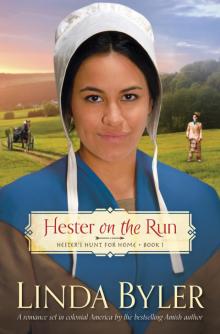 Hester on the Run
Hester on the Run Disappearances
Disappearances Big Decisions
Big Decisions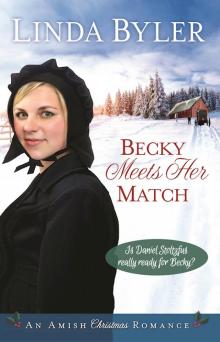 Becky Meets Her Match
Becky Meets Her Match Hope on the Plains
Hope on the Plains Christmas Visitor
Christmas Visitor